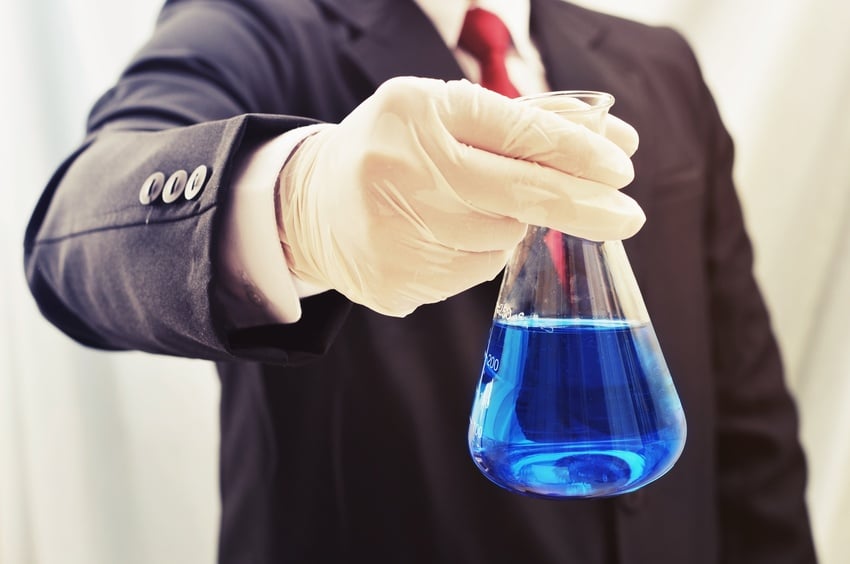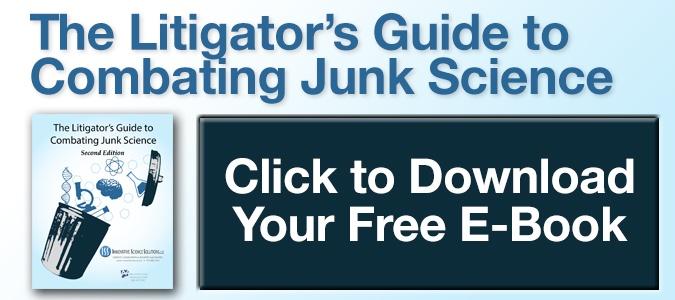by Tony B. Klapper, (former) Managing Director, Litigation Consulting & GC, A2L Consulting and David H. Schwartz, Ph.D., Co-Founder, Innovative Science Solutions
The successful litigator knows that one of the first and most important steps to be taken when confronted with complex science-based litigation is to identify and engage a top-notch testifying expert. The ideal testifier is one who is highly qualified, able to credibly communicate to a jury, and can educate the legal team. These characteristics go for experts involved in patent disputes, product liability litigation, and consumer fraud cases involving allegations that a supplement, drug, or device is not effective.
Testifying experts are indeed critical for the success of a case, but as we have discussed in a previous post, many litigators fail to recognize that it is equally important to engage an experienced and litigation-savvy consulting expert. To understand why, consider the following seven points.
1. Availability
If you have recruited the ideal testifying expert, his or her time may be limited by the day-to-day obligations as an opinion leader in their field. I am sure that most of the litigators reading this post have experienced the challenges of working with a testifier who teaches, is conducting scholarly research, or has just simply overcommitted to too many legal clients. When this happens, getting the expert’s attention may prove just as difficult as understanding the science upon which the expert relies. And because understanding the science enough to cross-examine the other side’s expert is a critical component of effective advocacy, having a consulting expert available to take the time to educate you and help you prepare your case can be indispensable.
2. Context
Consulting experts tend to understand the litigation landscape better than an academic testifying expert. With the exception of the oft-used professional testifier, most testifying experts are not particularly litigation savvy and may not be familiar with the manner by which scientific evidence in their field may be twisted and turned by more experienced testifiers. A consulting expert who has studied not only the literature, but the positions espoused by the adversary’s experts—as articulated in expert reports, depositions and trials—can help litigators more effectively prepare their testifiers’ reports and direct examinations, as well as prepare for cross.
3. Cost-Containment
Third, consulting experts provide the litigator with a means of evaluating an adversary’s case, as well as his or her own, and understanding where the strengths and weaknesses lie. As we all know, we live in an age when early case assessments have become critically important to the business client. Those clients increasingly demand that their outside counsel find ways to resolve resolvable disputes well before hundreds of thousands (if not millions) of dollars are spent in motions practice, discovery and expert retention. Having a consulting expert help assess your case before retaining your testifier often proves to be one of the most cost-effective ways to satisfy the client’s cost-saving demands.
 4. Discoverability Concerns
4. Discoverability Concerns
Notwithstanding changes to Fed. R. Civ. P. 26(b)(4)(B)-(C), discoverability concerns remain with testifying experts (particularly in state courts) that are not as relevant with consulting experts. Know your jurisdiction. In addition to all the reasons mentioned above and below for retaining a consulting expert, if you litigate in a state court that does not provide full work product protection to communications with testifying experts, beware. The consulting expert might be your only safe harbor for open and candid discussion about the scientific evidence.
5. Find the Best Testifiers
Fifth, the right consulting expert can help you find and recruit the ideal testifying experts, especially when the issues are extremely complex and esoteric. This is particularly true when the litigator has not had the time to fully immerse him or herself into the science. Until that happens, finding the right testifier can be a complete crapshoot. Who are the real thought-leaders in the field? Among them, are there any candidates who have espoused views antithetical to my client’s? They may say they haven’t, but how do you know without fully understanding the literature and that expert’s writings? Can the candidate’s methodology expose him or her to a blistering Daubert attack? These and other questions are critical in the search process. But who has the time and the skills to make these judgment calls? A good consultant can help in the vetting and selection process in ways that busy litigators often cannot.
6. Help To Ensure Victory
Sixth, in the age of increasing Daubert (and other expert) challenges, having a consultant available to help assess the adversary experts’ methodologies and brainstorm areas of attack can be the difference between winning and losing a case. Yes, lawyers can be very skilled at identifying the logical flaws, errors of omission, and unfounded inferences that plague many an expert’s analysis. But having a consulting expert dig into the literature and/or serve as a sounding board for lawyer-based “scientific” musings helps ensure that potential arguments are carefully vetted and those selected are truly effective.
7. Some Examples
Where can these consultants and consulting services be most helpful? Consider their use in patent disputes, personal injury litigation, and consumer fraud matters.
For example, pharmaceutical and medical device patent disputes revolve around demonstrating issues of patent validity and infringement. If you represent an innovator, you will be focused on demonstrating that the patent is valid under intense scrutiny and that your adversary is infringing on the teaching present in your patent. If you are defending a generic manufacturer, your goals will most likely be reversed. Consulting experts can help you perform these tasks and identify the right testifying experts to make these assertions. These non-testifying experts can scrutinize the laboratory notebooks and meeting minutes to spot documents that both support and potentially refute your case. For these types of cases, you will be looking for consulting experts with credentials in medicinal chemistry, drug metabolism, as well as basic cell and molecular biology.
In personal injury product liability cases involving healthcare products—such as pharmaceutical and medical devices, dietary supplements, agra-chemicals, and foods—consulting experts are perfectly positioned to work closely with counsel. The knowledgeable consulting experts can be instrumental resource in matters that involve a complex regulatory landscape and equally complex science-based issues. Consulting experts can help clients develop strategies and approaches that are central to the defense, and they can help identify the difficult-to-find regulatory testifying experts.
Finally, as many of our readers know all too well, consumer fraud cases are becoming extremely common, especially for products such as dietary supplements, cosmetics, and other consumer healthcare products. These cases generally involve allegations that no competent and reliable scientific evidence supports the advertised benefits of the products at issue. Like personal injury litigation, consulting experts are critical to an in-depth understanding of the science relevant to the case. Because there is a specific regulatory standard at issue in these cases, it is sometimes less important to have experts who are experts in the medical area at issue and more important to have consultants who understand regulatory standards and the types of studies that would be considered competent and reliable scientific evidence. Consulting experts in these cases will be able to evaluate and assess the substantiation reports that the defendant may have generated and they will help you perform an up-to-date, comprehensive review of the scientific literature relevant to a substantiation of the advertising claims at issue.
Other articles from A2L Consulting related to science-focused litigation:
- Free Download: Using Science to Prevail in Your Next Case or Controversy
- Free Webinar: Combining Expert Evidence and Argument Effectivily
- Is Litigation Coming for Major Retailers of Herbal Supplements?
- 7 Things Expert Witnesses Should Never Say
- Using Trial Graphics & Statistics to Win or Defend Your Case
- 10 Key Expert Witness Areas to Consider in Your Next Toxic Tort Case
- Making the Complex Understandable in Pharmaceutical Cases
- Walking the Line: Don't Coach Your Experts (Re: Apple v. Samsung)
- Free Download: The Environmental Litigation Trial Presentation & Trial Prep- E-Book
- Environmental Litigation Demonstrative Exhibits and Trial Graphics
- Fracking Litigation & Advocacy






Leave a Comment